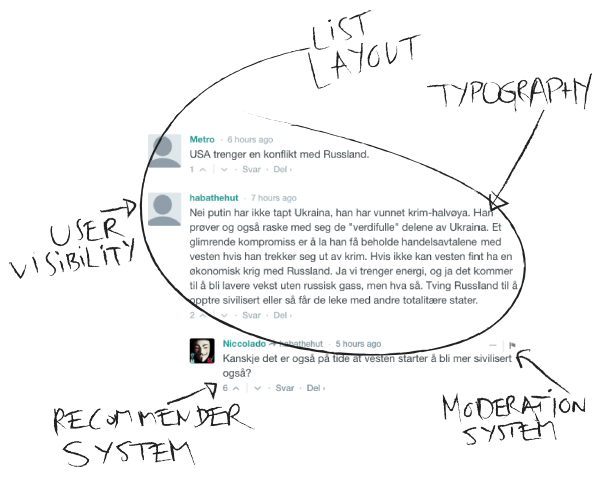Abstract (from the proposal)
In this thesis, I will study the designs of commenting sections in online magazines and newspapers. These are interfaces consisting of a variety of designed choices, such as layout, typography, moderation system and a recommender system that helps us to decide which comments to read first. Within each of these choices there are many possibilities that affects our use experience, whereas few of them are explored in research. In my research, I seek to study and visualize concept designs for the holistic use experience of these choices, with emphasis on enhancing the expressive possibilities and engagement.
The framing of the project is based on the idea of designs and artefacts as producers of social and cultural meaning. Existing research in this context is mainly focused on a functionalistic approach, as opposed to the discursive and semiotic approach I adopt. What does the design mean for us, and how does the designs of buttons, layout and typography effect our use experience?
As social media and technology has expanded our possibilities for expressing ourselves in the public sphere, rational arguments and emotional stories lives side by side, communicated in the same ways graphically; same fonts and few possibilities for communicating tone-of-voice. I will view the variety of these expressions as a design material for future concept designs.
I view the variety of expressions in dialogic interfaces – such as emotional expressions, arguments, questions, suggestions and personal stories – as a design material itself.
I divide the process into three stages; 1) in the first stage I will gain knowledge and analyse existing commenting sections and the various features these consists of, 2) in the second stage the focus is on gaining knowledge on how to visualize and prototype alternative concept designs for a fictional magazine commenting section, and 3) in the third stage I will evaluate, analyse and further develop these concept designs in collaboration with experts in the field, editors and designers.
My thesis will be an article-based contribution, with three articles, based on these three stages. The project will be finished in the spring 2017.

